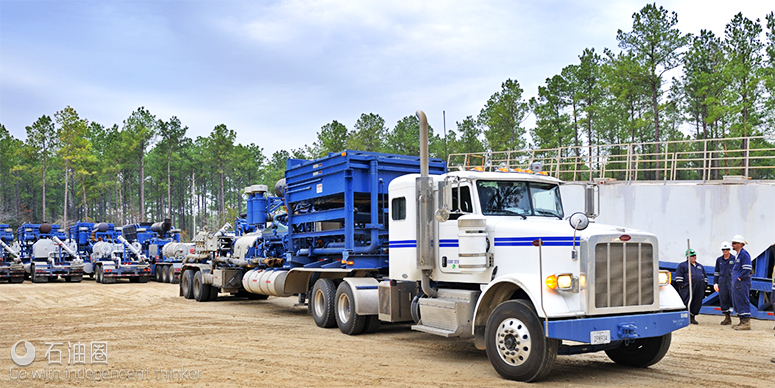Maximize effi ciency and reduce environmental impact Baker Hughes Rhino Bifuel pumps reduce air emissions, increase efficiency, and decrease diesel fuel consumption without sacrifi cing hydraulic horsepower. These hydraulic fracturing pumps maximize wellsite effi ciency and reduce environmental impact while maintaining the effectiveness of the fracturing job. Rhino Bifuel pumps reliably deliver fl uid into a well for hydraulic fracturing or acid stimulation operations. These robust units generate 2,000 HHP at pressures up to 15,000 psi (103.4 MPa), with the exact rate determined by the plunger size used in the fl uid end. Units can be confi gured with triplex or quintaplex pumps and are typically trailer mounted for easy transport to locations. Skid-mounted versions are also available.
High-performance Rhino Bifuel pumps deliver the same outstanding performance as our standard Rhino pumps, when they are modified to run on a combination of diesel and readily available liquefi ed natural gas (LNG), compressed natural gas (CNG), or natural gas. Even with substitution rates as high as a combination of 70% natural gas with 30% diesel, these pumps can produce 2,000 hydraulic horsepower.
Reduce your environmental impact without compromising performance in continuous multistage frac operations.
Using cleaner-burning natural gas, the Baker Hughes Bifuel service reduces diesel consumption, ensures productivity, and lowers HSE risks from spills and fi re hazards. Our proven bifuel pumps will extend your runtimes, maintain your hydraulic horsepower, and help you comply with environmental regulations
Applications
- Unconventional oil and gas formations
- Hydraulic fracturing operations
- Acid stimulation operations
- Workover and remediation operations
Features and Benefits
– Improves efficiency without loss of hydraulic power
– Reduces refueling requirements and risks
– Operates on a fuel blend or 100% diesel
- Reduced diesel consumption
– Meets all EPA emission standards
– Reduces NOx emissions by up to 50%
– Decreases particulate-matter emissions
– Nearly eliminates carbon monoxide
- Increased wellsite efficiency
– Extends pump runs as much as 2x conventional diesel-powered pumps
– Provides nonstop fracturing operations
– Improves personnel and job-site safety
– Lowers refueling operations and risks
case study
Cabot Oil & Gas Corporation, a Baker Hughes customer operating in the Marcellus shale play in Susquehanna County, Pennsylvania, wanted to improve the overall efficiency of its hydraulic fracturing operations while minimizing air emissions; reducing road traffic; and lowering health, safety, and environmental (HSE) risks. Baker Hughes proposed a Bifuel fracturing service, using the company’s Rhino™ Bifuel frac pumps.
The Rhino Bifuel pumps are able to replace as much as 70% of the engine’s diesel fuel supply with natural gas (field gas, liquefied natural gas, or compressed natural gas) with no loss in hydraulic horsepower. Also, the engines are capable of running on 100% diesel if necessary. Baker Hughes provided an entire fleet consisting of 14 Rhino Bifuel pumps to stimulate the customer’s 10 wells and 170 stages.
All of the natural gas used in the operation was supplied from the customer’s readily available field gas. The field gas was piped in from some of the customer’s producing wells to a gas processing unit (GPU) located near the fracturing pumps. The GPU removed water and other impurities from the field gas to avoid any problems with engine performance. The gas pressure was then reduced, and the gas was piped to a manifold and distributed to each bank of Rhino Bifuel pumps.
The Baker Hughes Bifuel technology performed exactly as expected, consuming 15,025 Mcf of field gas and delivering significant benefits in terms of both efficiency and environmental performance. There was no loss in hydraulic horsepower (HHP) and all 10 wells (170 stages) were fractured in 28 days, including a record-setting nine stages in a single day. Substitution rates were uniformly high and frequently reached the maximum rate of 70%. The substitution of cleanerburning natural gas for diesel lowered the wellsite’s emissions considerably, with nitrogen oxides (NOx) cut in half, particulate matter reduced 70%, and carbon monoxide emissions brought down to zero.
The operator calculated that the use of the Baker Hughes Bifuel fleet allowed them to offset approximately 110,000 gallons of diesel and save a substantial amount in fuel costs. In addition to the fuel costsaving, the Baker Hughes Bifuel pumps allowed the operator to eliminate more than 15* diesel resupply runs—simplifying logistics and reducing the amount of traffic at the wellsite and through the neighboring communities. The reduced diesel usage also lowered the HSE risks related to refueling operations, including challenging hot fueling operations.
In addition to the improved efficiency and environmental performance, the Bifuel service proved effective as well. In its first 30 days of production, the 10-well pad delivered a combined peak production rate of 201 million cubic feet (MMcf) per day and a combined average 30-day production rate of 168 MMcf per day.
Overall, the Baker Hughes Bifuel service provided the customer with a measureable increase in operational efficiency, significant cost savings, and a minimized environmental impact. In its announcement of the 10-well project, Cabot Oil & Gas commented, “The use of a [Baker Hughes Bifuel] fleet on the pad resulted in substantial cost savings for Cabot, while reducing the company’s environmental footprint through the displacement of approximately 110,000 gallons of diesel with its own natural gas.”
Benefits
- Replaced significant percentage of costly
- diesel fuel with cleaner-burning natural gas with no loss in hydraulic horsepower
- Lowered HSE risks and air emissions
- Reduced risk associated with multiple
- refueling operations and diesel resupply runs
Baker Hughes solution and results
- Delivered a Baker Hughes Bifuel fracturing service using 14 Rhino Bifuel pumps
- Stimulated the wells to help deliver substantial gas production (avg. 30-day production rate of 168 MMcf per day)
- Employed field gas/diesel fuel blend while maintaining HHP comparable to 100% diesel engines
- Reduced HSE risks associated with potential spills and hot fueling
- Replaced 110,000 gallons of diesel with cleaner-burning natural gas
- Eliminated 15+ diesel fuel resupply runs
- Improved fuel economics by replacing costly diesel with field gas


 石油圈
石油圈
